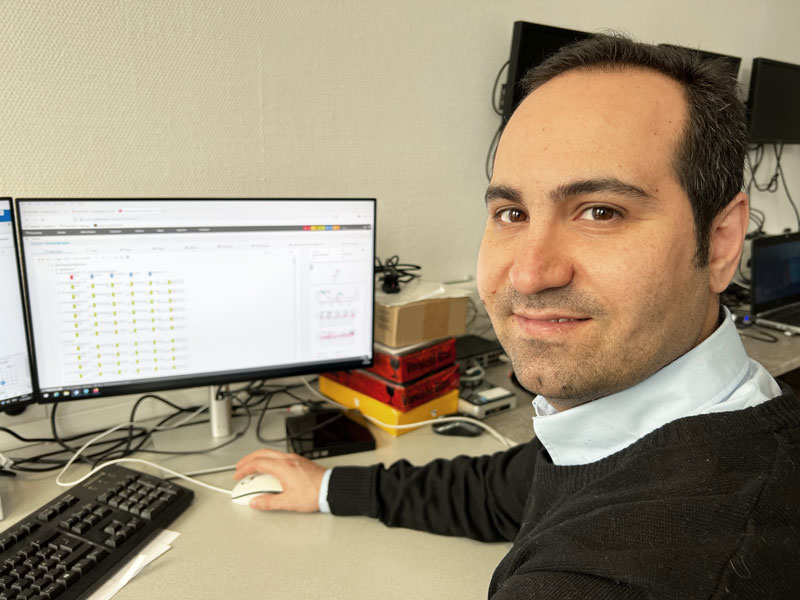Back to square one - from production to IT department

Mohammad Kamandar is new to the GEALAN IT department. Until October 2021, he was still working in production in Tanna. The new colleague has come full circle after his successful internal reapplication, as the Iranian had already worked as a computer scientist in his home country for many years.
Software, hardware, cloud systems, automation: all these things are not unknown to Mohammad Kamandar, who, after studying computer science in Iran, was employed for ten years as an IT specialist with the police. "The tasks and systems were different there, however," he says, describing why a training period with the GEALAN experts was urgently needed. "In addition, I don't speak German that well yet - but I want to learn it as soon as possible, have already taken private online language courses, and am currently completing one that GEALAN made possible for me."
Mohammad Kamandar fled Iran about three years ago. The fact that after his long journey, face-to-face language courses were hardly possible in Corona times was the least of his problems at the time. "I came to Germany via Turkey and Greece, started from scratch here," he explains. The job at the extrusion in Tanna is his first in Germany, and he will be employed there for five months from May 2021. When his Iranian papers are certified, he presents GEALAN with the recognised documents, including IT training. A win-win situation opens up: "We were looking for someone to assist us in IT support in Tanna," explains André Spranger, his supervisor at GEALAN, "and Mr Kamandar offered his expertise. Besides, he himself also wanted to return to his actual area of responsibility." The plan is for Mohammad Kamandar to look after the industrial IT at the site, which means, for example, fixing IT problems on production equipment, maintaining computers, monitors and printing solutions installed on machines. Andre Spranger: "Our goal is for him to know independently what needs to be done and to be able to take care of it if, for example, the laminating department reports an IT problem."

Mohammad Kamandar is currently working two days a week in Tanna and three days in Oberkotzau. The training makes this necessary (for the time being). Sooner or later, he will work four days in Tanna, where technical problems cannot usually be solved remotely. He will then spend only one day with the rest of the IT team: "He should be where he is needed as often as possible, but still not lose touch with the team," says André Spranger, describing the intended model.
Mohammad Kamandar is happy to be able to contribute his skills at GEALAN: "Working in production was new to me, I had to learn everything from scratch. Working with computers, software and networks is what I can and want to do." The familiarisation with the new job is bearing fruit; little by little, Mohammad Kamandar is acquiring what he needs for his daily work, so that he will soon be able to help his colleagues in Tanna run smoothly on their own. "He is very interested and gets involved," the supervisor praises the new colleague's commitment. "He deserves the chance to develop here. And he can also contribute his skills even better for the good of GEALAN."
Marc Schenk
17/08/2022
Recent news

Working for the future
Talking to GEALAN about sustainability is fun because nobody in this company is satisfied with simple answers. And because bright minds ask important questions, think about things carefully to seek good solutions, and then actually implement them. GEANOVA met with four of these clever people.

The revolution after the defeat
A sombre silence fills the car. A frustrated Ahmet Çak and his colleague Gyula Lélek have been driving on the Hungarian M1 motorway for about half an hour. The customer they had visited terminated their collaboration after hearing about a price increase. Çak just recently took over as Head of Sales for Hungary and negotiated new terms with all customers. Now, however, he has lost this one window manufacturer as a customer and suffered a defeat. The Annahegyi motorway restaurant at the MOL petrol station in Budapest serves a nice espresso so they exit the motorway. The frustration gives way to defiance over coffee and Çak motivates his colleague: ‘We’ve got to learn from this defeat!’ A ‘magic moment’ as he will later refer to it.

A strong bond
Neckties have been slung around the necks of men and women for centuries. It is a fashion accessory and style icon with its own holiday – International Necktie Day: on 18 October, the guards of honour in the Cravat Regiment ride through Zagreb and decorate statutes with cravats to send the message that neckties are Croatian. It’s even said that in the 17th century France’s King Louis XIV took a liking to the ‘à la manière croate’ (Croatian-style) cravats that Croatian mercenaries wore. The Sun King introduced the piece of uniform to Parisian society. The flagship store of Croata, a specialty shop for ties and scarves, is located in the Oktogon Passage in Zagreb’s city centre. GEANOVA met Klaudija Čota and Robert Križanović there. 18 years spent working together at GEALAN Croatia connects them, just like a tightly tied knot in a necktie.
Use our manufacturer locator.
Do not miss any news!
I want to receive newsletter "Reference Building of the Month" and GEALAN news via E-Mail (approx. twice a month) - free of charge and terminable at any time.